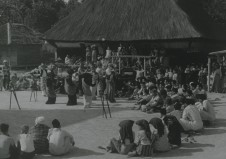Turang, by Bachtiar Siagian - U.S. Premiere!

Turang
Los Angeles Filmforum presents
Turang by Bachtiar Siagian
Sunday June 1, 2025, 7:00pm
At 2220 Arts + Archives, 2220 Beverly Blvd., Los Angeles CA 90057
Tickets: $15 general, $10 students/seniors, free for Filmforum members
US Premiere of a classic film from 1958!
Discover a landmark of Indonesian cinema, recently restored and screened at the Rotterdam Film Festival and the Barbican in London
Set against the backdrop of Indonesia’s struggle for independence from Dutch colonial rule, Turang tells the poignant love story of Tipi and freedom fighter Rusli—a narrative that captured the hearts of many in the region and reflected the emotional pulse of a generation in transition.
In 1958, Turang screened to wide acclaim at the Afro-Asian Film Festival in Tashkent, Uzbekistan—a space created to foster cinematic collaboration among newly independent and decolonizing nations across Africa and Asia. Tragically, just a few years later, it was destroyed during the wave of anti-communist violence that swept through Indonesia, erasing a vital piece of the country’s cinematic memory.
Today, we are privileged to witness its restoration—as a powerful act of narrative reclamation.
– Zaina Bseiso, curator
“After resisting the Dutch army, freedom fighter Rusli suffers serious injuries. Tipi and her father, the chief of the Dutch-occupied village, become responsible for Rusli’s safety and recovery. This neorealist film prominently features the contribution of ordinary people to the liberation struggle.
“Leftist filmmaker Bachtiar Siagian’s long-lost film Turang is one of several post-independence Indonesian films depicting the independence struggle against the Dutch. Unlike other films that mostly center on the military sphere, this film highlights the crucial role of ordinary people in liberation struggles. Set in an indigenous Karo community, the film depicts, in neorealist style, the people’s land, traditions, and unwavering determination for freedom.
“Rusli, a people’s militia leader, was on a mission with a Karo man when Dutch troops confronted them. Severely injured and unable to continue the journey, Rusli’s comrades hide him in Seberaya village, located on Dutch territory. Tipi and her father, the village chief, are entrusted with his safety and recovery. From that risky circumstance, the film shows the ordinary lives of the villagers, their genuine solidarity with the freedom fighters, a blossoming romance between Tipi and Rusli, and the difficulties brought about by the raids of the Dutch army.
“Turang is an important archive of the left regarding decolonization. History has seen how third-world nationalist elites and military regimes have hijacked national independence, and Turang expresses a call to recognize and restore national sovereignty to its rightful owner: the people.”
– Bunga Siagian, daughter of Bachtiar Siagian
Bachtiar Siagian (1923-2002) was one of the greatest Indonesian filmmakers active between the nation’s independence and the events of autumn 1965. He was in charge of the 3rd Afro-Asia Film Festival in Jakarta, and was a member of Lekra, a leftist cultural organization (1950-1965). As a filmmaker and left-third wordlist, Bachtiar anchored his cinematic realism in the third-world social realities. Most of his films were lost due to the anti-communist violence by the New Order authoritarian regime in 1965, which led to the persecution and often the murder of left-wingers and others deemed subversive. Siagian, one of the most prominent members of Indonesia’s leading Communist cultural movement, Lembaga Kebudayaan Rakyat, ended up in prison for twelve years, never to direct a film again.

Turang
Turang
Director: Bachtiar Siagian
Indonesia | 1958 | B&W | Sound | 87’
The film won four awards at the Indonesian Film Festival in 1960, including Best Film.
US Premiere! (to the best of our knowledge)
From Devika Girish in Film Comment:
Indonesian curator and artist Bunga Siagian had never seen Turang (1958), the acclaimed film by her father, Bachtiar Siagian, while growing up. She had never seen any of his films, in fact—she had only read about them in books. Bachtiar was a major Communist revolutionary filmmaker in the 1950s and ’60s, but after the attempted military coup in 1965 and the purge that followed, which led to the U.S.–backed dictatorship of Suharto, he was imprisoned and seemingly all his films were destroyed. In the last decade, however, Bunga’s search for her father’s work started bearing fruit. In 2013, a print of his film Violetta (1962) turned up at the Sinematek Indonesia in Jakarta, having been donated by a “mobile screening” manager. And in 2023, Turang was found at the Russian Federation Archive in Moscow—a copy had survived there after the film had screened at the Afro-Asian Film Festival in Tashkent, Uzbekistan in 1958.
A couple of weeks ago, Bunga presented Turang to a packed audience at the International Film Festival of Rotterdam (IFFR). It was the crown jewel of a retrospective dedicated to films screened at the three Afro-Asian Film Festivals of the late ’50s and early ’60s: editions in Cairo in 1960 and Jakarta in 1964 followed the inaugural Tashkent event. These festivals embodied the spirit of the historic Afro-Asian Conference of 1955 in Bandung, Indonesia, where 29 Asian and African nations, many of them newly independent or in the process of decolonizing, met to seed an anti-imperialist alliance dedicated to self-determination, sovereignty, and peace. With the globe split during the Cold War between the First World of the U.S. and the West, and the Second World of the USSR and the Eastern Bloc, these nations—which together comprised more than half the earth’s population at the time—declared themselves the “Third World,” charting an independent path that, six years later at the Belgrade Conference of 1961, would be formalized as the “Non-Aligned Movement.”
